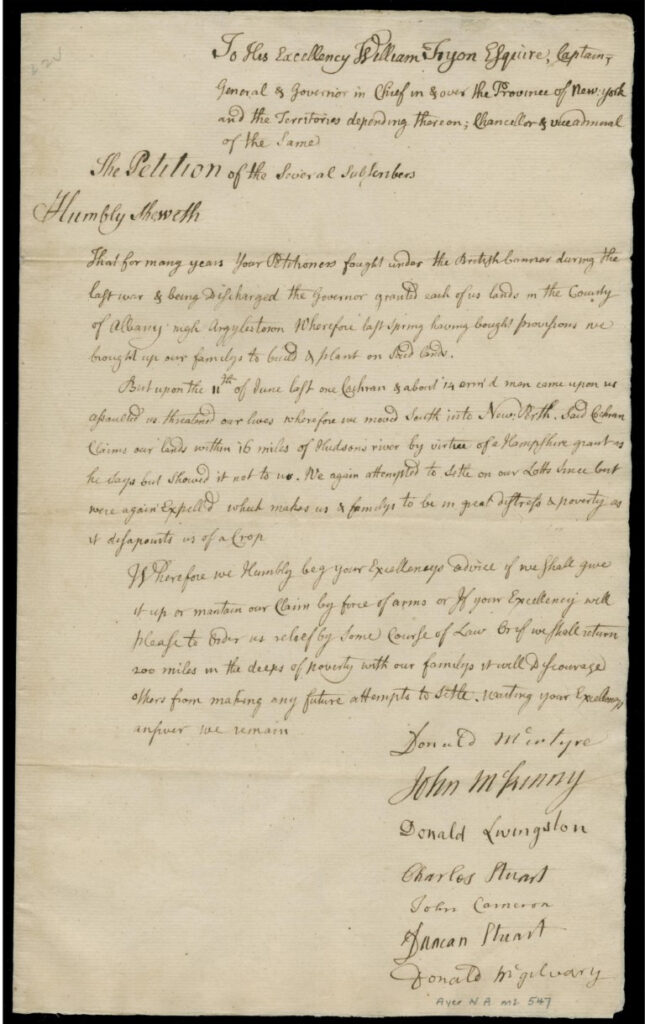Two hundred and forty-seven years ago, on June 11, 1771, my six-times great-grandparents were accosted by a band of armed locals who assaulted them, threatened their lives, and then ran them off their land. Donald and Mary McIntyre were forced to flee several miles south with their three young children and six neighbouring families, caught in a jurisdictional dispute between New York and New Hampshire.
The McIntyres had just recently arrived to their 200 acre piece of the colony of New York (along the North River in Albany County) and had begun the onerous process of clearing and improving the land for farming. Donald had been granted this land by the British King after discharge from fighting in the Seven Years War. But on that day in June, the family found out that New Hampshire also claimed their land. Not only that, a group calling themselves the “Green Mountain Boys” had taken up arms to roust the “New Yorkers,” then tear down the log houses they had built, pile them in heaps and burn them.
McIntyre and the others tried to return later, but were again expelled. Without a crop, they were left completely without means to support and feed themselves.
From where they had fled in New Perth (now Salem, New York) they petitioned the Governor, asking what he would have them do. Should they give up the lands, or defend them with force? Or maybe there was some course of law by which the Governor could deal with the situation?

The Governor dealt with it by ordering the Justices of the Peace in Albany to investigate this “riot.” Three months later, in November, one of the Justices responded. Here’s part of what he wrote:
On the very Eve of a long hard winter it is very Schocking to see so many poor familys reduced to so great Distress and if they had not been hospitably entertained by the Rev’d Mr Clark & his people their Straits must have been exceeding great.
The Governor then issued a warrant for the arrest of the Green Mountain Boys and their leader, who were determined to be responsible. The leader, Ethan Allan, remained at large and I do not know if the fourteen Boys who assaulted the settlers were ever captured.
In any case, after seven years of war, instead of beginning their new lives in the American Colony and reaping the first crops on land granted to them for loyalty to the King, for five months my six-times great grandparents had to live on the charitable gifts of friends and the congregation of the Reformed Presbyterian Church in New Perth.
There is more to the story of these ancestors, which I’ll write about in Part 2. Meanwhile, I’m reflecting on the nature of hardship, imagining the conversations among those seven displaced families while they decided what next steps to take, and looking around at my own privileged circumstances this day in June, 247 years later.
My heartfelt thanks goes out to Jim Issak and John Blythe Dobson, whose diligent research unearthed this previously unpublished petition of our ancestor, Donald/Daniel McIntyre. Jim recently shared with me their excellent article, “Daniel McIntyre, United Empire Loyalist, of The Town of Argyle, Albany County, New York, and Grimsby Township, Lincoln County, Upper Canada,” published in the July 2017 issue of The New York Genealogical and Biographical Record.
Well done cousin!
Couldn’t have done it without you, Jim! 🙂
Very interesting story. I enjoyed reading it and looking forward to the next chapter.💕
Thanks, Patsy! Troubles aren’t over yet for the intrepid Daniel!
Wow, that is quite some story. Poor people, so quickly and brutally displaced. It sure took longer then expected. No gov. handouts or welfare existed at that time. At least friends and the church came through.
You’re right, Yolly. Brutal times. We are so lucky to live now!
What a great story! I have heard of Ethan Allan but always in he context of being heroic and brave. It is fascinating to hear the other side of it, even more so with your personal connection. Looking forward to hearing how the story ends!